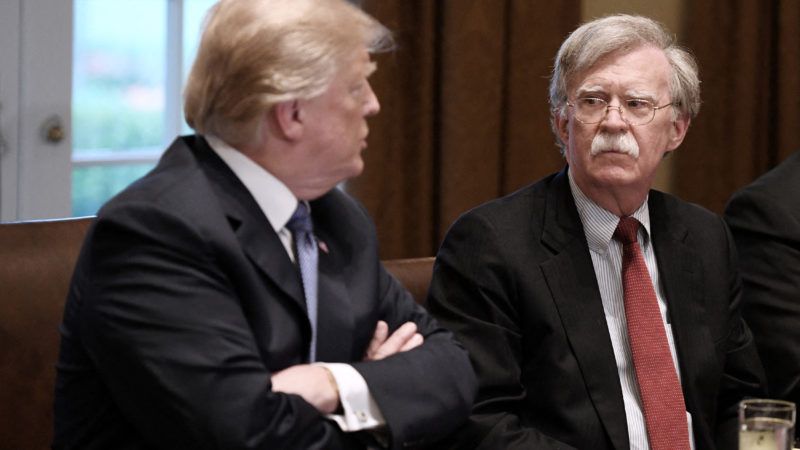Bolton: Trump's Tough-on-China Stance Was a Campaign Strategy, Not a Trade Policy
In a new book, former White House national security advisor John Bolton says Trump's trade deal negotiations with Chinese President Xi Jinping "commingled the personal and the national."

Rather than securing a better trade agreement for American farmers and blue-collar workers, the real goal of President Donald Trump's trade war with China was a second term in the White House. So says John Bolton, Trump's former national security advisor, in a Wall Street Journal excerpt from his forthcoming book, The Room Where It Happened.
Bolton writes that he would be "hard-pressed to identify any significant Trump decision" that wasn't driven by the president's re-election plans. But Bolton singles out Trump's fraught and sometimes frothy relationship with Chinese President Xi Jinping as a particularly striking example of how Trump "commingled the personal and the national."
Bolton relates the details of a conversation Trump had with Xi by phone in June 2019, in which Trump stressed that "making a trade deal with China" would be "a big plus for him politically." In a separate conversation between the two men months later, Bolton writes, Trump "stressed the importance of farmers and increased Chinese purchases of soybeans and wheat in the electoral outcome." He adds that he would use the exact words uttered by Trump, "but the government's prepublication review process has decided otherwise."
Later in the summer, as China was cracking down on protesters in Hong Kong and as the 30th anniversary of the Tiananmen Square massacre approached, Bolton reportedly tried to persuade Trump to speak out about China's terrible human rights record. "Who cares about it? I'm trying to make a deal," was Trump's response, Bolton writes.
Bolton was fired from the White House in September of last year, so he wasn't around to witness the final stages of what became a limited "phase one" trade deal signed by Trump and Xi in December. But it seemed apparent to many observers—myself included—that the deal had more to do with domestic politics than it did with boosting international trade or easing tensions between the world's two biggest economies.
For starters, there was the promise that China would increase its purchases of American farm and industrial goods by $200 billion. Those targets were never realistic—and indeed, China is not even close to being on pace to hit them. But the key thing, politically, is that the U.S. agreed not to hold China accountable until 2021 at the earliest. In other words, not until after the 2020 presidential election.
That meant Trump could hit the rally circuit to boast about how he had stood up to China—as he quickly did, telling a gathering of Ohio farmers in January that they'd have to buy bigger tractors to keep up with the demand from China under the deal he'd inked.
In that regard, Bolton's descriptions of Trump's priorities seem to fit what we know perfectly. Rather than getting tough on China, Trump appears to care far more about the appearance of getting tough with China than actually accomplishing substantial policy.
That's been fairly obvious to anyone who cared to look. After all, how many economists and journalists have debunked Trump's claim that China is paying for the cost of his tariffs, or pointed out that trade deficits don't work the way Trump seems to think they do? But the tariffs were a useful way to appear to be doing something. From the outside, Trump's trade policy has looked like a haphazard, self-interested mess from the start; Bolton confirms that's how it looked inside the White House too.
"Trade matters were handled from day one in a completely chaotic way," Bolton writes in the Journal excerpt. "Over and over again, the same issues. Without resolution, or even worse, one outcome one day and a contrary outcome a few days later."
"The whole thing made my head hurt," Bolton concludes.
Mine too.
